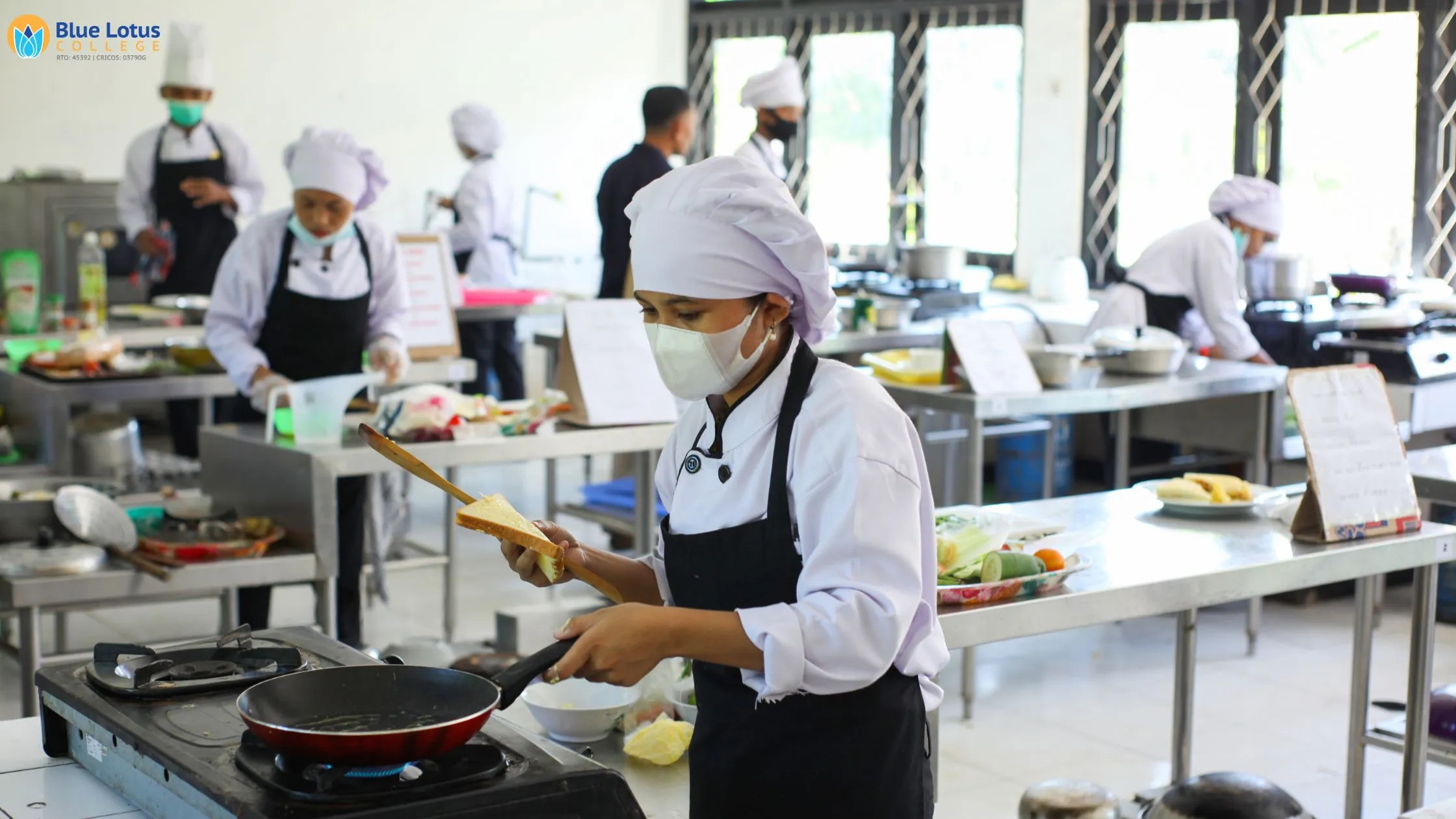
A Certificate III in Commercial Cookery is a VET course that allows an advancement into the world of culinary professions. This qualification equips you with essential skills and knowledge for working in a professional kitchen setting. Graduating from this degree provides a foundation for a career in hospitality, as a result of combining academic knowledge and practical experience gained during the course.
Learn In Detail About:
Certificate III in Commercial Cookery
Holders of a Certificate III in Commercial Cookery have access to a comprehensive programme designed to prepare them to be competent culinary professionals. Students in this course will receive a well-rounded culinary education through core modules and electives.
The core units are the main modules that focus on the most critical aspects of cookery. This will likely include food safety and hygiene, kitchen operations, and essential cooking techniques. These kinds of units in the course provide an explicit architecture for giving you skills that can be applied in any setting within the culinary industry.
Learn In Detail About:
Cookery Course Fees in Australia
Elective units allow you to tailor your learning experience according to your interests and career goals. These can include advanced pastry techniques, international cuisine, and kitchen management. The choice of electives, therefore, is essential in raising your expertise levels and providing versatility in the job market.
In Certificate III in Commercial Cookery, one requires a combination of practical and theoretical skills to be competent. Success will include knife skills, kitchen safety, time management, multitasking, etc.
Learn In Detail About:
Certificate III in Commercial Cookery for International Students
Knife Skills and Kitchen Safety
Knife skills are considered the backbone of any kitchen operation. Proper cutting techniques enhance work efficiency and safety in the kitchen. Above all, a chef needs to be aware of safety measures in the kitchen.
Fast-paced commercial kitchens demand that their workers be good at time management and multitasking. Two critical skills to acquire so you will not fall behind in a fast-moving kitchen are balancing multiple tasks efficiently and prioritising work effectively.
Learn In Detail About:
Hospitality Courses In Australia
Hands-on training forms an intrinsic part of the course. By participating actively in practical sessions, you are given an opportunity to put theoretical knowledge into practice, develop techniques, and gain firsthand experience.
Internships and work experience are invaluable to putting the learning into real-life practice. During this course, students get hands-on experiments in professional kitchens under the guidance of experienced chefs, building up a network in the industry.
Learn In Detail About:
Kitchen Management Course In Australia
Building good relations with your instructors and peers is very important for improving the learning experience. Discussions, feedback, and collaboration on projects enrich one’s insight and, in turn, offer an excellent support environment for learning.
Furthermore, learning workshops and extra-curricular activities are offered outside the regular classroom in this course. This could also introduce you to new techniques, trends, and innovations being launched within the culinary world.
Learn In Detail About:
Best Culinary School In Australia
While Certificate III in Commercial Cookery is rewarding, it also has stresses attached to it, such as long practice hours, a busy kitchen environment, and pressure, back and wrist pain, etc.
Effective stress management requires a healthy work-life balance. Relaxation techniques, regular exercise, and time management can significantly improve your ability to stay focused and energised.
Constructive feedback is the impetus for growth. Welcome it with a cheerful attitude and view it as continuous improvement. Learn from errors and strive for perfection of your skills.
Working under pressure is very common in a commercial kitchen. For instance, developing coping strategies like deep breathing and task management will help you stay calm and focused during any high-pressure situation.
Certificate III in Commercial Cookery will open all sorts of doors within a culinary career, from entry-level through senior positions as sous chef, pastry chef, chef, kitchen manager, etc.
Further on, upon certification, any candidate can work as a chef, sous chef, or kitchen manager. Each comes with its share of responsibility while offering progressive opportunities to grow in your career.
You can work to achieve higher certification levels and bring forth more employment options. It is this level of specialisation in patisserie, culinary management, or international cuisine that will help set you apart from the rest.
What makes an excellent aspiring cook is passion, hard work, and a commitment to lifelong learning. Embracing the challenges and staying committed to your craft will be the way to success.
Passion for cooking keeps you creative and innovative, while hard work helps you overcome obstacles and keeps you pushing forward in the profession. One without the other gives one some degree of success in the kitchen.
Plug into online sources, tutorials, cookbooks, and peers who can help you learn even more. These will bring new recipes and techniques, and valuable knowledge into your culinary growth.
A Certificate III in Commercial Cookery is the ideal one-way ticket to a successful culinary career. By understanding the ins and outs of the course structure, the development of skills, maximisation of learning opportunities, and how to deal with challenges to excel at certification, one can step into a rewarding and dynamic world of culinary arts.
This Certificate III in Commercial Cookery course is designed for all those looking to gain the necessary cooking skills and knowledge in food preparation to work within the hospitality sector.
Key skills include knife proficiency, kitchen safety, time management, multitasking, and a great depth of background knowledge in the theory and practice of cooking.
Students who graduate can become chefs, sous chefs, and kitchen managers; some further their education to continue in the field. Graduates may find employment in restaurants, hotels, catering services, and many other organisations related to food preparation.
This course will require commitment, active participation during the hands-on training, good time management, and a positive attitude toward learning and feedback.